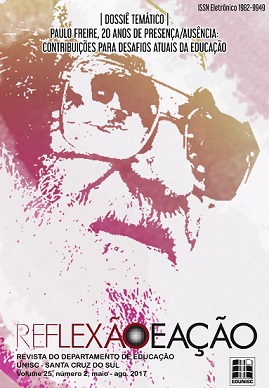WOMEN AND THE EDUCATIONAL HERITAGE OF ILLITERACY
DOI:
https://doi.org/10.17058/rea.v25i2.8645Keywords:
Women, Illiteracy, Discourse Analysis, Educational HeritageAbstract
The observations that illiteracy rates portrait the Brazilian educational debt are common because different income strata have had unequal access to schooling throughout generations. Therefore, illiteracy has historically been associated with terms that suggest treatment, repair, cure, eradication. This research puts in evidence other dimensions of this “educational debt”: it treats illiteracy as educational heritage and places the women that have concluded the Program Mulheres Mil (Thousand Women) as the main focus of analysis. It studies what is known about these women as a social group that attend this Program, analyzing the main documents related to this public policy: Cooperation Therm (2016), Legal Base (s.d), Methodological Guide (s.d), and Primer (2014). The methodological operationalization uses Foucault’s discourse analysis on the “things said” by these women in narrative interviews, in the direction of constructing an analytical route between the discursive approximations in correlation with different discursive fields. It identifies social, historical, political, and cultural implications that form the educational heritage of illiteracy.Downloads
Downloads
Published
How to Cite
Issue
Section
License
The submission of originals to this journal implies on the transference, by the author(s), of the printed and digital publishing rights. The author´s rights to the published articles are the author´s, the journal has the rights over the first publication. The author(s) can only use the same results in other publications, indicating clearly that this journal was the original publisher. Since we are an open access journal, the free use of articles is permitted for educational and scientific applications, as long as they inform the source according with the CC-BY license from Creative Commons.


